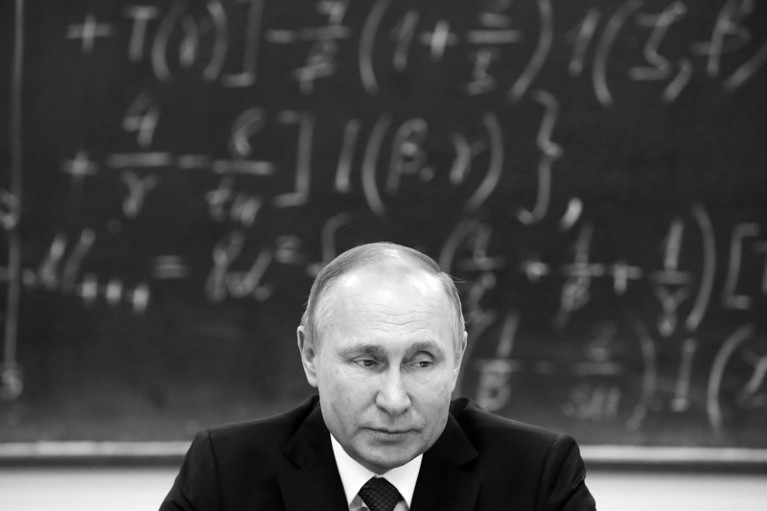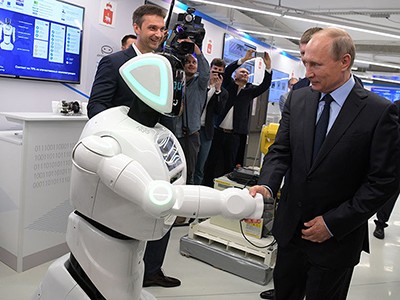
Vladimir Putin must back promising words on scientific reform in Russia with strong action.Credit: Mikhail Metzel/TASS/Getty
Vladimir Putin will hardly be remembered as a patron of science. Not for Putin the scientific philosophy of dialectical materialism that helped to drive research in the former Soviet Union and that remains influential among many of his contemporaries. His long rule over Russia, as both president and prime minister, shows that he is more inclined to line up with the nation’s Orthodox Church. His 2016 choice of an ultra-conservative religious historian as science and education minister was no accident.
But Putin, who is expected to win another six years in power in the Russian presidential elections on 18 March, did not get where he is today without being able to play both sides. He acknowledges — and has often said — that Russia’s poor research and development capacity is an obstacle to economic growth and prosperity. His clique of political cronies includes scientists and research administrators. And their lobbying has not been in vain. Russian science spending has palpably (if by no means fully) recovered in recent years from near-collapse in the 1990s.
Russian science chases escape from mediocrity
Outsiders recognize this: international sanctions in response to Russia’s occupation of the Crimea have spared East–West research collaboration. And Russia’s demanding education system continues to produce a supply of excellent students and scientific talent. Yet too many Russian labs produce too little. Why is Russian science unable to take full advantage of its resources?
Putin would never admit it, but China — the other great power in the East — helps to highlight where Russia is going wrong. China also has a state-dominated economy, yet one that manages to create favourable research incentives. China’s state-funded science system has its own problems, but is increasingly based on merit and competition and attracts foreign talent. Lively academic exchange with the West adds constant stimulus. And oriented towards the global market, industrial research in China operates in accordance with global demands, quality standards and management practices.
Russia, where anti-Western sentiment prevails, follows a quite different path. Fixed-term academic employment of postdoctoral researchers, who produce the majority of research in most countries, including China, is virtually unknown in Russian universities and research institutes. Instead, most academic scientists enjoy permanent positions for decades and feel little pressure to perform. Only a small fraction of public research spending comes as grants allocated through competition, with the rest being simply handed out by officials. The Russian Academy of Sciences — the country’s foremost basic-research organization — is struggling to get on its feet after years of unproductive wrangling over money, direction and leadership.
Russia also puts too much trust in top-down innovation by state-owned companies— in aerospace and energy, for example. But these have struggled to develop, let alone export, innovative goods and ideas.
Russia’s international political isolation, inflicted by Putin’s erratic course and exacerbated by nationalistic rhetoric, is another obstacle. A recent crackdown on ‘undesired foreign agents’, including science-funding charities, sends a hostile signal to the outside world. Cronyism and corruption start at the very top and undermine trust in research (and business) opportunities.
Putin clearly understands this. He has promised to increase science budgets further and to tackle funding bottlenecks that hurt competitive science. And on the face of it, a new national science strategy he launched in 2016 looked positive.
Under that plan, government funding was supposed to focus on a set of societally pressing topics — including energy research, health, digitalization, and security — which many other industrialized countries have also prioritized. Underperforming institutes run by the Russian Academy of Sciences would be restructured, or closed, and funding decisions spread over more shoulders to eliminate wheeling and dealing. None of this has happened yet.
Russia must wise up. If it’s serious about science, then the steps are simple. Most urgently, the scattering of scarce resources indiscriminately among many large research organizations must stop. Grant money should be targeted towards the best projects and research groups. That’s a goal that requires transparency, fair competition and international expertise to review the research — all eminently possible. A competitive programme to encourage young researchers to run independent groups for up to five years was launched last year by the Russian Science Foundation, a government-run grant-giving agency, and is a first step.
The country must go further, and remove notorious bureaucratic hurdles to doing science, including obstructive customs rules and import restrictions on research equipment.
A stronger Russia relies on a strong research base. Russian scientists — and the watching world — are tired of empty words. Putin defines himself as a man of action. Let’s see some.

 Russian science chases escape from mediocrity
Russian science chases escape from mediocrity
 Russian secret service to vet research papers
Russian secret service to vet research papers
 Russia turns screw on science foundation
Russia turns screw on science foundation






